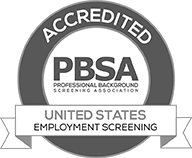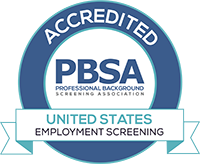BLOG
Data Provider Sued For Allegedly Non-Compliant Practices
August 4, 2020
An FTC investigation of a purported Consumer Reporting Agency serves as a reminder that honest, compliant practices are essential.
The FTC Takes Note
The Federal Trade Commission (FTC) is a government agency that protects consumers. Their mission is to prevent “anti-competitive, deceptive, and unfair business practices through law enforcement, advocacy, and education without unduly burdening legitimate business activity.” They filed a lawsuit against an online company that claims to help customers learn “the truth” about neighbors, friends, service providers and others.
This website promotes a product they call Reputation Profiles - reports about consumers that they say are “better than background checks.” The site notes their profiles can contain criminal records, civil documents, lawsuits, social media content, employment and education details and more.
This product and the company’s billing policies caught the FTC’s attention.
A Lawsuit
The FTC filed a lawsuit against this company. It alleged they use misleading billing and marketing practices. Two of their primary charges suggested the online data provider:
Displays “teaser background reports” that insinuate they have criminal and sex offender records. When a visitor searches for a person, the site allegedly gives the impression that the subject is likely to have these items on their profile. This might be done to encourage consumers to order reports so they can view this potentially adverse data.
Produces confusing content to get visitors to purchase auto-renewing memberships. The allegation suggests that visitors who only want a single report often inadvertently enter into an agreement in which they pay the company every month.
CRAs Must Comply With The FCRA
An important point in this case is that the defendant is said to be a Consumer Reporting Agency (CRA). A CRA is an organization that regularly compiles and provides consumer reports such as background checks.
Every CRA must comply with a federal law called the Fair Credit Reporting Act (FCRA). The FCRA requires CRAs to:
• Confirm their customers have a permissible purpose for ordering reports.
• Take steps to ensure maximum possible accuracy for the data they supply.
• Allow consumers to dispute the information contained in a report about them.
The FTC complaint suggests this business does not verify the accuracy of their information or offer an option for disputing content. It also asserts they do not require customers to have a permissible purpose.
If the court agrees this company is a CRA, then the claims against them are likely to proceed.
The Importance Of Fair, Compliant Screening
Employers and other organizations review background checks when considering job seekers, potential renters and credit requests. It is essential for these reports to be up-to-date, accurate and compliant with applicable laws.
When organizations need to order background checks, best practice is to work with a CRA that is accredited by the Professional Background Screening Association (PBSA – formerly the NAPBS). Accreditation is only granted to CRAs that continuously meet high standards of professionalism, ethics and accountability. Learn more about the PBSA.
Running Background Checks
When your organization is hiring, promoting or making other business decisions, you can use background checks to help make informed choices. It is imperative to have a permissible purpose and only consider current, reportable data. Employers should not rely on public records websites that do not comply with the FCRA.
The team at Backgrounds Online produces compliant reports that can be used to make employment-related decisions. We are accredited and strive to keep up with laws that affect employers. Contact us when you’re ready to order background checks that help you build strong teams and maintain safe workplaces.







